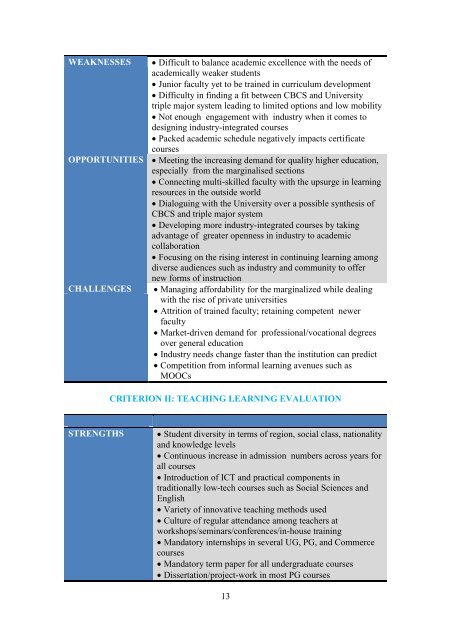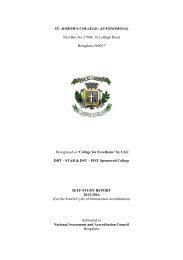- Page 1 and 2: ST. JOSEPH'S COLLEGE (AUTONOMOUS) P
- Page 3 and 4: Table of Contents TITLE Page no. 1
- Page 5 and 6: EXECUTIVE SUMMARY St. Joseph's Coll
- Page 7 and 8: The mix of staff from different reg
- Page 9 and 10: the facilities for presentations an
- Page 11: College collaborates with ITC in re
- Page 15 and 16: CRITERION III: RESEARCH, CONSULTANC
- Page 17 and 18: CRITERION V: STUDENT SUPPORT AND PR
- Page 19 and 20: CRITERION VII: INNOVATION AND BEST
- Page 21 and 22: A. PROFILE OF THE AUTONOMOUS COLLEG
- Page 23 and 24: Hostel o Boys' Hostel: Yes o Girls'
- Page 25 and 26: 28. PG Computer Science +Cognate su
- Page 27 and 28: 21. Does the College have a teachin
- Page 29 and 30: PCM 65 1 CBBT 26 1 PEM 56 1 CZBT 21
- Page 31 and 32: acquaintance with a variety of life
- Page 33 and 34: 1.1.3. How does the College involve
- Page 35 and 36: The Science departments are gearing
- Page 37 and 38: 11. B. Com. 12. B. Sc. MCB (Microbi
- Page 39 and 40: Political Science Big Data Analytic
- Page 41 and 42: B. Com. MCZ (Microbiology, Chemistr
- Page 43 and 44: 1.2.7. What is the policy of the Co
- Page 45 and 46: The second is made up of the Choice
- Page 47: 1.4.4. What are the quality sustena
- Page 50 and 51: working is thus made available to i
- Page 52 and 53: B.Sc.: A candidate, who has passed
- Page 54 and 55: 2.1.3. Does the College have a mech
- Page 56 and 57: Table 2.3: Applications for Postgra
- Page 58 and 59: 2.1.7 Was there an instance of the
- Page 60 and 61: Department of Commerce conducts a b
- Page 62 and 63:
2.2.5 How does the institution iden
- Page 64 and 65:
Discussion on completion of portion
- Page 66 and 67:
the cognitive and affective dimensi
- Page 68 and 69:
Shri. Sandeepa Data Scientist Cogni
- Page 70 and 71:
The Department has organized nearly
- Page 72 and 73:
All four postgraduate courses in th
- Page 74 and 75:
JSTOR and DELNET. Many departments
- Page 76 and 77:
2.4.2. How are the members of the f
- Page 78 and 79:
Maharashtra, West Bengal, Bihar, Ma
- Page 80 and 81:
2.4.7. How many visiting Professors
- Page 82 and 83:
The College has many senior teacher
- Page 84 and 85:
The College policy on assessment is
- Page 86 and 87:
2.5.6. What is the average time tak
- Page 88 and 89:
Marks are entered using the bar-cod
- Page 90 and 91:
2.6.4. Give Programme-wise details
- Page 93 and 94:
CRITERION III RESEARCH, CONSULTANCY
- Page 95 and 96:
3.1.3. List details of prioritized
- Page 97 and 98:
3.1.4. What are the proactive mecha
- Page 99 and 100:
Technologies for Sustainable Ecosys
- Page 101 and 102:
3.1.9. Details on the College initi
- Page 103 and 104:
4. Mr. Madappa M.B. Biotechnology 2
- Page 105 and 106:
3.2.3. Is there a provision in the
- Page 107 and 108:
3.3.3. Does the College provide res
- Page 109 and 110:
∗faculty members on the organizat
- Page 111 and 112:
ioinformatics-based projects. Depar
- Page 113 and 114:
Dr. Ebenezer Wilson Environmental S
- Page 115 and 116:
cancer awareness programs, and part
- Page 117 and 118:
3.6.6. Reflecting on objectives and
- Page 119 and 120:
College has worked with Government
- Page 122 and 123:
CRITERION IV INFRASTRUCTURE AND LEA
- Page 124 and 125:
Auditorium Complex: In 2014, a thre
- Page 126 and 127:
4.1.3. Does College provide all dep
- Page 128 and 129:
Table 4.4: Special Sports Facilitie
- Page 130 and 131:
Online Public Access Catalogue (OPA
- Page 132 and 133:
Map 4.2: Digital Learning Centre an
- Page 134 and 135:
for departmental requirements. This
- Page 136 and 137:
Reprography: The library has a sepa
- Page 138 and 139:
4.2.10. List the infrastructural de
- Page 140 and 141:
Table 4.17: Student-Computer Ratio
- Page 142 and 143:
College is also conscious of the de
- Page 144 and 145:
The capacity of the water-storage t
- Page 147 and 148:
CRITERION V STUDENT SUPPORT AND PRO
- Page 149 and 150:
All departments have a co-curricula
- Page 151 and 152:
Facilities available in College Yes
- Page 153 and 154:
5.1.8. What type of support service
- Page 155 and 156:
films, and maintaining portfolios o
- Page 157 and 158:
Special care is taken in case of st
- Page 159 and 160:
Students‘ grievances usually tend
- Page 161 and 162:
Students participating in intercoll
- Page 163 and 164:
11. CEZ 27.27 59.09 72.22 83.33 62.
- Page 165 and 166:
Pixels is a platform for the buddin
- Page 167 and 168:
8 Abharan Bangalore University & Al
- Page 169 and 170:
13. Richa S Patel Attended the Wint
- Page 171 and 172:
5.3.5. How does College involve and
- Page 174 and 175:
CRITERION VI GOVERNANCE, LEADERSHIP
- Page 176 and 177:
workshops, seminars and conferences
- Page 178 and 179:
*Fostering global competencies amon
- Page 180 and 181:
the marginalized sections to achiev
- Page 182 and 183:
6.2.2. Enunciate the internal organ
- Page 184 and 185:
many of the issues that arise durin
- Page 186 and 187:
prepared and given to the College M
- Page 188 and 189:
Requisitioning the funds required f
- Page 190 and 191:
2015-16 6.4.4. Have the accounts be
- Page 192 and 193:
2014-15 2015-16 187
- Page 194 and 195:
6.4.6. Is there any provision for t
- Page 196 and 197:
story of continuous quality enhance
- Page 199 and 200:
CRITERION VII INNOVATION AND BEST P
- Page 201 and 202:
Impact of cultural eutrophication o
- Page 203 and 204:
the choice based credit system and
- Page 205 and 206:
objective has been to provide an ef
- Page 207 and 208:
Student Support and Progression Cam
- Page 209 and 210:
All these programs are monitored by
- Page 211:
The response to the Joseph‘s Rese
- Page 214 and 215:
o percentage of students doing proj
- Page 216 and 217:
The Department is funded by DBT und
- Page 218 and 219:
Prabhakar vitro, In-silico Genome a
- Page 220 and 221:
2014 Dr. Debra Bevitt 2014 Dr. Stev
- Page 222 and 223:
36. State whether the programme/ de
- Page 224 and 225:
PG-4:1 10. Number of academic suppo
- Page 226 and 227:
23. Sr. Sagaya Mary B. and Divakar
- Page 228 and 229:
MCB CBBT 2014-15 45 16 29 24 (9M+15
- Page 230 and 231:
STRENGTHS 1. Department conducts ce
- Page 232 and 233:
20. Ms. Laveena Mariet M.Sc. Asst P
- Page 234 and 235:
Dr. Michael Rajamathi Journal of El
- Page 236 and 237:
22. How many students have cleared
- Page 238 and 239:
31. List the teaching methods adopt
- Page 240 and 241:
14. C. Nethravathi, A. Anto Jeffery
- Page 242 and 243:
45. Tony Thomas, Ronald J. Mascaren
- Page 244 and 245:
8. Percentage of classes taken by t
- Page 246 and 247:
29. Was any need assessment exercis
- Page 248 and 249:
6. EVALUATIVE REPORT OF DEPARTMENT
- Page 250 and 251:
22. Student profile course-wise: 23
- Page 252 and 253:
Graduation (SCoRe) 2015 Mrs. Marian
- Page 254 and 255:
Post graduate: M.Sc: 35:1 10. Numbe
- Page 256 and 257:
18. Student projects/participations
- Page 258 and 259:
e) Students‘ laboratories: PG stu
- Page 260 and 261:
Campus recruitment for the PG stude
- Page 262 and 263:
6. Ms.Nikitha K R M.A Asst Professo
- Page 264 and 265:
Books:- 13. Muthukrishnan Subhashin
- Page 266 and 267:
Term papers: All teachers have guid
- Page 268 and 269:
24. Student progression UG to PG -
- Page 270 and 271:
32. Give details of student enrichm
- Page 272 and 273:
37. Detail any five Strengths, Weak
- Page 274 and 275:
13. Research facility / centre with
- Page 276 and 277:
32. Give details of student enrichm
- Page 278 and 279:
10. EVALUATIVE REPORT OF THE DEPART
- Page 280 and 281:
11. Pai, Nalini, ―Cinema, Politic
- Page 282 and 283:
2. A Two-day UGC sponsored National
- Page 284 and 285:
Yes. Through dept meetings, valuabl
- Page 286 and 287:
3. Some members of the faculty have
- Page 288 and 289:
4. Bheemappa K., Nandini N., Kumar
- Page 290 and 291:
Students‘ Achievements: 1.Vidya B
- Page 292 and 293:
30. Number of students of the depar
- Page 294 and 295:
4. Twostudents(II CEB/Z), Kaveri an
- Page 296 and 297:
19. Student projects ‣ Percentage
- Page 298 and 299:
13. EVALUATIVE REPORT OF THE DEPART
- Page 300 and 301:
STRENGTHS: Committed, well qualifi
- Page 302 and 303:
9. Programme-wise Student Teacher R
- Page 304 and 305:
24. Diversity of staff Percentage o
- Page 306 and 307:
37. Detail any five Strengths, Weak
- Page 308 and 309:
Ongoing Minor Research Projects dur
- Page 310 and 311:
PASS PERCENTAGE -POST GRADUATE 2010
- Page 312 and 313:
4 th March 2016 16 - 17 / 9/2016 Ni
- Page 314 and 315:
16. EVALUATIVE REPORT OF THE DEPART
- Page 316 and 317:
8. Dr.Lora Rita Goveas 2015- 16Post
- Page 318 and 319:
5)Vishnupriya 2015 Kaiseslautern Un
- Page 320 and 321:
17.EVALUATIVE REPORT OF DEPARTMENT:
- Page 322 and 323:
‣ About 5% students have done in-
- Page 324 and 325:
f) Research laboratories: Not appli
- Page 326 and 327:
31. Prof. Sandeep Shastri, National
- Page 328 and 329:
33. Give details. State whether the
- Page 330 and 331:
. students on staff, curriculum as
- Page 332 and 333:
19. Student projects o percentage o
- Page 334 and 335:
20.EVALUATIVE REPORT OF THE DEPARTM
- Page 336 and 337:
OPPORTUNITIES: With a large pool o
- Page 338 and 339:
4 2014-15 Mr. Ananda, K. S 5 2014-1
- Page 340 and 341:
Statistics 12/2013 Mr. Umesha, H L
- Page 342 and 343:
22. EVALUATIVE REPORT OF THE DEPART
- Page 344 and 345:
2012-13 50 47 09 38 99 2013-14 60 5
- Page 346 and 347:
Creating wildlife conservation and
- Page 348 and 349:
23. How many students have cleared
- Page 350 and 351:
24. EVALUATIVE REPORT OF THE DEPART
- Page 352 and 353:
25. EVALUATIVE REPORT OF THE DEPART
- Page 354 and 355:
Yuvajanagada Mele Madyamagala Parin
- Page 356 and 357:
III CYCLE ACCREDITATION PEER TEAM R
- Page 358 and 359:
IV. Institutional Opportunities: In
- Page 360 and 361:
The IQAC is much better organized w
- Page 362 and 363:
355
- Page 364 and 365:
357
- Page 366 and 367:
359
- Page 368 and 369:
361
- Page 370 and 371:
363
- Page 372 and 373:
365
- Page 374 and 375:
367
- Page 376 and 377:
369
- Page 378 and 379:
371



